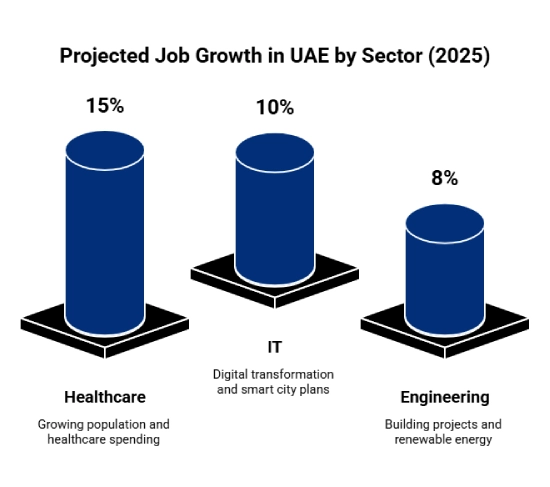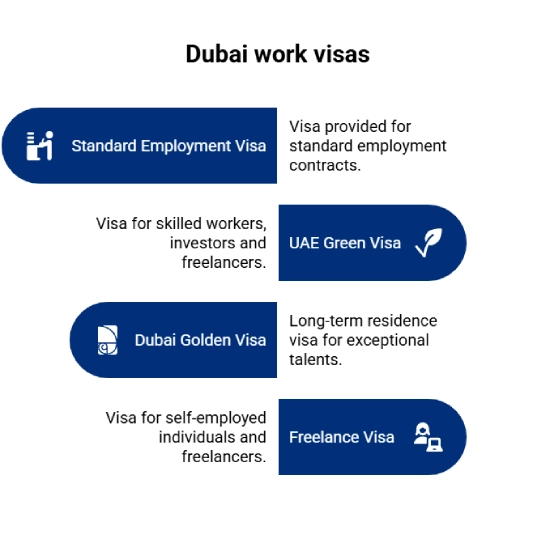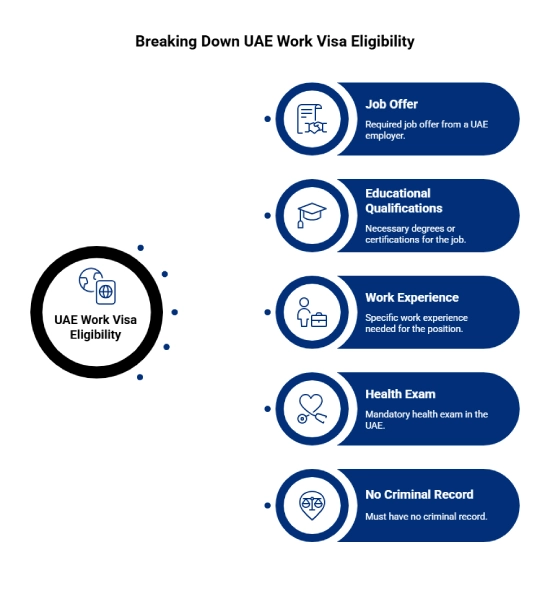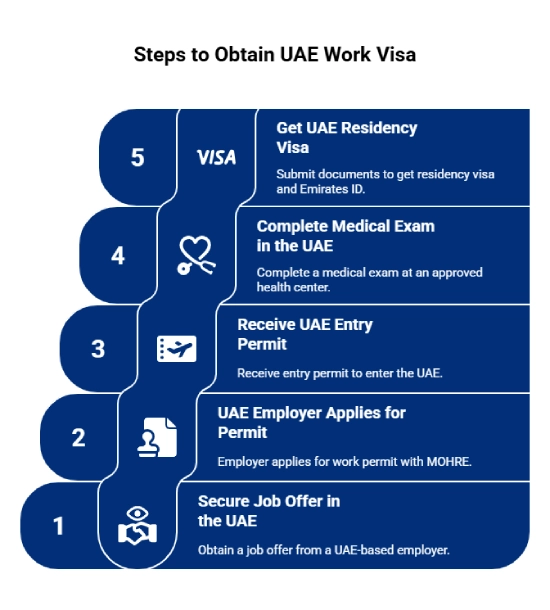UAE Job Outlook for UK Professionals
For UK professionals eyeing career growth, the United Arab Emirates (UAE) remains a top choice. The UAE work visa, or Dubai work visa, facilitates tax-free income, working in a country with strong infrastructure, and varied job market for international professionals.
- Job Market Growth: The UAE is expected to add over 500,000 jobs by the end of this year, thanks to economic diversification and global investments.
- Healthcare Sector Expansion: The need for healthcare staff should increase by 15% because of a growing population and more healthcare spending.
- IT Sector Boom: The IT field expects 10% yearly growth, driven by digital changes and smart city plans.
- Engineering Opportunities: Building projects and renewable energy are causing an 8% rise in the demand for engineers.
- Flexible Work Policies: Programs like Dubai's Our Flexible Summer are improving work-life balance, which makes the UAE more appealing to expats.

*Want assistance to apply for Dubai work visa? Y-Axis is here to assist you with the process.
Why Work in the UAE?
The UAE is a lucrative place to work because of its tax-free income, good salaries, and diverse job options in a multicultural setting. The UAE's economy, especially in finance, tech, and tourism, makes for a lively job market where your career can grow. The UAE also has great infrastructure, a high quality of life, and is safe.
- Tax-Free Income: You get to keep more of what you earn since you don't have to pay income tax.
- Location: The UAE's position between Europe, Asia, and Africa makes it a central spot for global business.
- Good Living: Modern facilities, safety, and a mix of cultures help create a high standard of living.
- Job Growth: Fast economic growth and a variety of industries mean more chances to move up in your career.
- Modern Workplace: A focus on tech and new ideas makes for an energizing place to work.
UAE Job Market Trends
The job market in the UAE for this year shows these traits:
- The UAE's economic plan to depend less on oil is making technology, health, and banking grow.
- New jobs are popping up thanks to money put into AI, cybersecurity, and better digital setups.
- The plan to have no net emissions by 2050 is boosting the need for jobs in green energy and eco-friendly fields.
- More places are letting staff work remotely or have bendable hours, which makes workers happier.
*Need guidance to search for suitable jobs in Dubai? Y-Axis is here to offer complete support with the process.
In-Demand Industries & Skills
According to the Dubai International Talent & Research Centre (DITRC) and government strategic plans, demand is strongest in:
- Information Technology (IT)
- Healthcare
- Construction & Engineering
- Logistics & Supply Chain
- Finance & Banking
- Hospitality & Tourism
Emerging & High-Demand Skills
- Artificial Intelligence & Machine Learning
- Cybersecurity
- Data Science & Analytics
- Sustainability & Renewable Energy
- Project Management & Cloud Platforms
These needs align closely with the UAE Vision 2031 and National AI Strategy, reflecting the country's focus on becoming a regional leader in tech, green energy, and innovation.
Top In-Demand Occupations in the UAE
In the UAE, jobs in tech, healthcare, engineering, finance, and hospitality are really hot right now. IT people like software developers and cybersecurity experts are wanted, as are healthcare workers like doctors, nurses, and lab techs. Civil, mechanical, and electrical engineers are in demand, too, along with finance and accounting pros, salespeople, marketers, and hospitality staff. There are also many openings in education, law, and logistics.
Also read…
Top In-Demand Occupations in the UAE for UK Professionals
Healthcare Sector
The UAE’s healthcare field is growing, putting more attention on good patient care and better treatments.
|
Job Role |
Average Monthly Salary (AED) |
|
General Practitioner |
25,000 |
|
Registered Nurse |
15,000 |
|
Medical Laboratory Technician |
12,000 |
|
Radiologist |
35,000 |
|
Pharmacist |
18,000 |
|
Physiotherapist |
14,000 |
|
Dental Surgeon |
30,000 |
|
Healthcare Administrator |
20,000 |
|
Emergency Medical Technician |
10,000 |
|
Clinical Psychologist |
22,000 |
Information Technology (IT)
The IT field is growing fast because of digitalization and smart city projects.
|
Job Role |
Average Monthly Salary (AED) |
|
Software Developer |
20,000 |
|
Data Analyst |
18,000 |
|
Cybersecurity Specialist |
25,000 |
|
IT Project Manager |
22,000 |
|
Network Engineer |
17,000 |
|
Cloud Solutions Architect |
30,000 |
|
AI/Machine Learning Engineer |
28,000 |
|
DevOps Engineer |
24,000 |
|
IT Support Specialist |
15,000 |
|
Business Intelligence Analyst |
19,000 |
Engineering
There is a high requirement for engineers because of both new infrastructure projects and the focus on making things sustainable.
|
Job Role |
Average Monthly Salary (AED) |
|
Civil Engineer |
18,000 |
|
Mechanical Engineer |
17,000 |
|
Electrical Engineer |
17,500 |
|
Project Engineer |
20,000 |
|
Structural Engineer |
19,000 |
|
Environmental Engineer |
21,000 |
|
Chemical Engineer |
22,000 |
|
Industrial Engineer |
18,500 |
|
QA/QC Engineer |
16,000 |
|
Safety Engineer |
17,500 |
Finance and Accounting
The financial sector is strong and presents many chances for those working in it.
|
Job Role |
Average Monthly Salary (AED) |
|
Financial Analyst |
20,000 |
|
Accountant |
15,000 |
|
Auditor |
18,000 |
|
Tax Consultant |
22,000 |
|
Investment Banker |
35,000 |
|
Risk Manager |
28,000 |
|
Compliance Officer |
24,000 |
|
Budget Analyst |
19,000 |
|
Payroll Specialist |
14,000 |
|
Financial Controller |
30,000 |
Education and Teaching
The education field is expanding as it places importance on quality and global standards.
|
Job Role |
Average Monthly Salary (AED) |
|
Primary School Teacher |
12,000 |
|
Secondary School Teacher |
14,000 |
|
ESL Teacher |
13,000 |
|
University Lecturer |
20,000 |
|
Curriculum Developer |
18,000 |
|
School Counselor |
16,000 |
|
Special Education Teacher |
15,000 |
|
Education Administrator |
22,000 |
|
Librarian |
12,000 |
|
Teaching Assistant |
10,000 |
Dubai Work Visa Options for UK Professionals
UK professionals have multiple options for UAE or Dubai work visas. Here are some common ones.
- Standard Employment Visa
- UAE Green Visa
- Dubai Golden Visa
- Freelance Visa

Standard Employment Visa
The Standard Employment Visa is the most frequently issued work permit in the United Arab Emirates. With this visa, foreign people can live and be employed in the UAE for a fixed time, usually two to three years. The employer provides sponsorship, which requires both a work agreement and approval from the Ministry of Human Resources and Emiratisation (MoHRE).
UAE Green Visa
The UAE Green Visa is for skilled workers, freelancers, investors, and business owners. It lets them live and work in the UAE without needing a company to sponsor them. It gives people more freedom than regular work visas. This visa generally lasts five years and can be extended. People can sponsor themselves and bring their families over.
Dubai Golden Visa
The Dubai Golden Visa, a long-term UAE residency program, grants 10-year renewable visas to qualified investors, entrepreneurs, and talented people. It seeks to attract and keep foreign skills, promoting economic growth and variety, especially in industries like tech, education, and health. Golden Visa holders can live, work, study, and invest in the UAE without a local sponsor, giving them more flexibility.
Freelance Visa
A UAE freelance visa lets people live and work as independent contractors in the UAE. It gives them flexibility and a chance to work in a busy business place. This visa is well-liked by those in media, tech, design, and education, allowing them to offer services without needing a traditional employer.
Eligibility Criteria for Dubai Work Visas
The eligibility criteria for UAE work visas are given below.
- A job offer from an employer in the UAE is needed (except for Green and Freelance Visas).
- You will need degrees or certifications that fit the job.
- The job needs certain work experience.
- You have to pass a health exam in the UAE.
- You must have no criminal record.

Required Documents for Dubai Work Visa
The required documents to apply for UAE work visa are given below.
- A passport that is valid for at least six months.
- Current passport-size photos that meet the requirements.
- Officially certified copies of your degrees and diplomas.
- A signed work agreement from your employer in the UAE.
- Medical exam results done in the UAE.
- Your Emirates ID application form and biometric information.
Dubai Work Visa Application Process
The procedure to apply for UAE work visa is given below.
Step 1: Secure a job offer from an employer in the UAE.
Step 2: Your UAE-based employer will then apply for your work permit with the Ministry of Human Resources and Emiratisation (MOHRE).
Step 3: Once the work permit is approved, you will be issued an entry permit to enter the UAE.
Step 4: After you arrive, you are required to complete a medical exam at a health center approved by the UAE government.
Step 5: Submit all required documents to get your residency visa stamped and your Emirates ID issued.

Dubai Work Visa Processing Time
Detailed information about the processing time for UAE work visas is given below.
|
Visa Type |
Processing Time (Estimated) |
|
Standard Employment Visa |
10 to 15 working days |
|
UAE Green Visa |
15 to 25 working days |
|
Dubai Golden Visa |
30 to 45 working days |
|
Freelance Visa |
10 to 20 working days |
Cost of Dubai Work Visa
Detailed information about the application costs for UAE work visas are given below.
|
Visa Type |
Estimated Cost (AED) |
|
Standard Employment Visa |
AED 3,000 – AED 7,500 |
|
Green Visa |
AED 2,280 – AED 3,880 |
|
Golden Visa (10 years) |
AED 4,850 – AED 6,000 |
|
Freelance Visa |
AED 7,000 – AED 9,500 |
Benefits of Working in the UAE
For UK citizens looking for opportunities abroad, the UAE provides a mix of career growth, good earnings, and appealing lifestyle. Here’s why many professionals choose to work there:
- No Income Tax: International professionals can keep more of their money because there is no income tax.
- Good Pay and Benefits: Many jobs come with competitive salaries and extras such as housing, transport, insurance, and plane tickets.
- Modern Living: The UAE offers a high standard of living with its top-notch facilities, luxury options, and diverse population.
- Safe Place to Live: The UAE is a safe and politically stable country with not much crime.
- Job Opportunities: The UAE has many chances for career advancement in different fields, from big international firms to government projects.
Tips for UK-Based Applicants to Work in the UAE
For UK residents considering employment in the UAE, consider these steps to improve your prospects:
- Examine the Job Market: Research which sectors are expanding this year and find roles that match your skills.
- Adjust Your CV: Format your CV for the UAE job market, including a photograph, your nationality, and a clear job history.
- Apply Through Reliable Sources: Use reputable job boards, recruitment firms, or company websites to avoid fraudulent offers.
- Learn About Cultural Norms: Study local customs and business practices to adapt to the UAE workplace.
- Confirm Visa Sponsorship: Check that your employer can sponsor work visas and follows the Ministry of Human Resources & Emiratisation (MOHRE) rules.
How-To Guide for Job Seekers in the UAE
Step 1: Identify In-Demand Roles
Use job boards like Bayt, Naukrigulf, or LinkedIn UAE to search for roles in high-demand sectors.
Step 2: Prepare Your CV to UAE Standards
Ensure your resume includes a photo, contact details, and is tailored to your sector.
Step 3: Apply through Official Portals
Apply via MoHRE-approved platforms and follow employer application instructions carefully.
Step 4: Research Visa Requirements
Depending on your role, apply under a sponsored employment visa or explore options like the Green Visa or Freelance Permit.
Step 5: Understand Labour Laws
Familiarize yourself with UAE’s updated labour law (Federal Decree-Law No. 33 of 2021) to understand your rights and obligations.
Emiratisation Policy & Workforce Regulations
The UAE’s Emiratisation mandate is reshaping hiring across the private sector. Currently, companies with 50 or more employees are required to:
- Hire 1% more Emiratis annually until a target of 10% is reached.
- Comply or face financial penalties under MoHRE regulations.
In parallel, the Ministry of Human Resources and Emiratisation (MoHRE) has launched:
- 18 new digital labour services to support employers and job seekers
- Updated remote work and flexible work laws, aimed at modernising workforce participation and compliance
Summary: UAE Job Market
| Factor | Key Insight |
| Global Hiring Rank | UAE ranks #1 with +48% Net Employment Outlook |
| Top Hiring Sectors | Transport, Energy, Consumer Goods, IT, Healthcare |
| Economic Indicator | PMI: 54.0 ; Employment Index: 51.4 |
| Salary Trends | Wage growth flat; rent up 16% year-on-year in Dubai |
| In-Demand Skills | AI, Cybersecurity, Green Energy, Project Management |
| Policy Update | Emiratisation target: +1% hiring yearly; enforcement |
How Can Y-Axis Help You?
Y-Axis assists UK professionals in relocating to the UAE by providing support in several key areas:
- Job Search: A team helps find jobs that match your qualifications.
- Resume and Cover Letter Writing: Professionals prepare your resume for the UAE job market.
- Visa Processing: We offer complete help with applications and paperwork.
- Interview Preparation: Receive personalized coaching to improve your interview skills for UAE jobs.
- Post-Arrival Support: Assistance is available for housing, Emirates ID registration, and medical check-ups when you arrive.
Y-Axis aids your career move to the UAE in industries like healthcare, IT, education, and finance.
Apply Now
Looking for Inspiration
Explore what Global Citizens have to say about Y-Axis in shaping their future
Frequently Asked Questions
